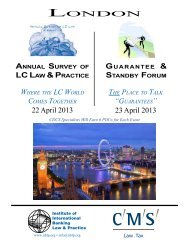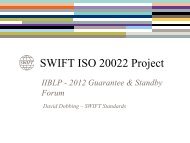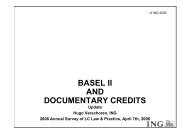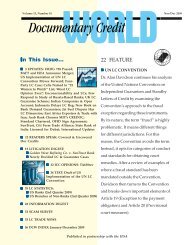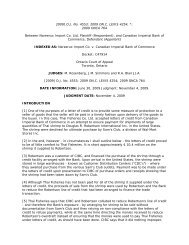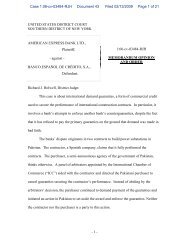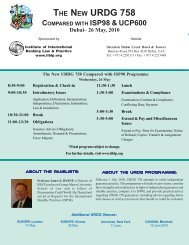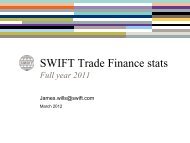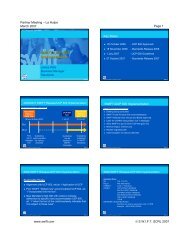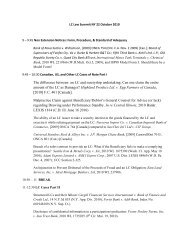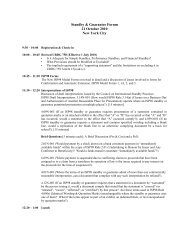FEATURE - The Institute of International Banking Law & Practice
FEATURE - The Institute of International Banking Law & Practice
FEATURE - The Institute of International Banking Law & Practice
Create successful ePaper yourself
Turn your PDF publications into a flip-book with our unique Google optimized e-Paper software.
<strong>FEATURE</strong><br />
established recognition for a<br />
digital signature in the United<br />
States and banks have to<br />
follow standard practice.<br />
<strong>The</strong>re is a “digital signatures<br />
act”, but there is no national or<br />
recognized system that<br />
authenticates them. Banks<br />
were advised to be very<br />
careful on how they use the<br />
words “digital signatures”.<br />
Any authentication system<br />
only identifies the sender, not<br />
the actual person who sent the<br />
message.<br />
A related issue is an MT700<br />
(Issue <strong>of</strong> a Documentary<br />
Credit) where the receiving<br />
bank assumes that the sender<br />
is the issuer, but the<br />
instructions state to send<br />
documents to a completely<br />
different bank. If the<br />
presenting bank gets a refusal<br />
from the other entity, is it<br />
proper Where does the<br />
engagement lie Others agreed<br />
this can be troublesome,<br />
noting that some banks use an<br />
MT700 rather than an MT710<br />
(Advice <strong>of</strong> a Third Bank’s or a<br />
Non- Bank’s Documentary<br />
Credit) as they should.<br />
Overview and Update:<br />
<strong>The</strong> LC Year in Review<br />
Jim WILLS gave an<br />
overview <strong>of</strong> SWIFT for the<br />
past year. SWIFT has not<br />
received any requests for<br />
changes due to the<br />
implementation <strong>of</strong> UCP600.<br />
<strong>The</strong> deadline for submitting<br />
changes for the next revision<br />
<strong>of</strong> SWIFT standards is June<br />
2008. <strong>The</strong> most common<br />
message sent is the MT103.<br />
Messages regarding trade<br />
transactions account for only<br />
about one percent <strong>of</strong> the total<br />
messages going through<br />
SWIFT. Open account<br />
messages are growing much<br />
more dramatically.<br />
<strong>The</strong> following changes take<br />
effect in November 2008:<br />
1. <strong>The</strong> MT760 (Guarantee)<br />
will be renamed to include<br />
standby letters <strong>of</strong> credit.<br />
2. <strong>The</strong> MT769 (Advice <strong>of</strong><br />
Reduction or Release) will also<br />
apply to standby letters <strong>of</strong><br />
credit.<br />
3. In Field 40C (Applicable<br />
Rules) <strong>of</strong> the MT760, SWIFT<br />
will add the code word ISPR<br />
and remove the code word<br />
URCG. <strong>The</strong> code words<br />
NONE and OTHR will remain<br />
unchanged.<br />
4. Unless otherwise<br />
specified, the rules specified in<br />
Field 40C will also be the rules<br />
to which the counterguarantee<br />
is subject. This was<br />
the number one change<br />
requested last year, mainly by<br />
Europe. Banks should used the<br />
code word NONE if the rules<br />
to which the counter guarantee<br />
are subject are not the same as<br />
the rules to which the<br />
guarantee is subject.<br />
5. Field 79 (Narrative) <strong>of</strong><br />
the MT499 and the MT799 Free<br />
Text Messages will still be the<br />
same size in the number<br />
characters, but the field will be<br />
repeatable until it reaches a<br />
maximum limit <strong>of</strong> 10,000<br />
characters.<br />
6. Field 79 <strong>of</strong> the MT707<br />
(Amendment to a<br />
Documentary Credit) can be<br />
repeated, but only twice. <strong>The</strong><br />
maximum message size will<br />
increase from 2,000 characters<br />
to 10,000 characters.<br />
7. In the MT734 (Advice <strong>of</strong><br />
Refusal), Field 77J<br />
(Discrepancies) will increase in<br />
size to 70*50.<br />
<strong>The</strong> Trade Services Utility<br />
(TSU) is an open account<br />
mechanism. Shipping<br />
documents and certificates are<br />
now a part <strong>of</strong> this. Fifty-four<br />
trade banks in 24 countries or<br />
territories are currently<br />
participating. SWIFT is looking<br />
at 2009 to start the process <strong>of</strong><br />
changing trade messages to an<br />
XML format.<br />
Among questions raised by<br />
the audience, Annual Survey<br />
delegates were reminded that<br />
because MT 760 Field 40C can<br />
contain laws, and not just ICC<br />
rules, banks have to be careful<br />
in how it is used.<br />
Buddy BAKER (Atradius)<br />
followed with an update <strong>of</strong><br />
Basel II. Already effective in<br />
Canada, Mexico, and Europe,<br />
Basel II will not go into effect<br />
in the United States until 2009.<br />
At that time it will be<br />
mandatory for the 11<br />
institutions categorized as<br />
“core banks” in the United<br />
States which represent onethird<br />
<strong>of</strong> the assets in the US.<br />
This covers regulatory capital<br />
16 Documentary Credit World ■ June 2008



